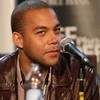Puff Daddy at Butter on November 5, 2015, in New York City. Photo by Shareif Ziyadat/Getty Images
Advertisement
"I was at home with my girl and wanted to watch some gangster shit. So I got on the Netflix, and we watched Paid in Full," Combs explained during the introduction to the evening, going on to say that Charles Stone III's cult-classic 2002 film provided the inspiration for his new album Money Makin' Mitch. Claiming that the album was, like the film, "a Shakespearean tale that needs to be told because the black man is God, and we comin'." Puffy suggested Money Makin' Mitch was also a prequel to his previous album, Last Train to Paris. The city is pictured on MMM's cover, an Annie Leibovitz photo of a fur coat-clad, sunglasses-wearing Puffy with a pensive Kate Moss as they exit a motor vehicle, surrounded by paparazzi, taken in 1999.A screening of sorts then commenced, although the images—a black-and-white assemblage of NYC street scenes cut to the beat of the album and chock-full of experimental film clichés—were clearly secondary to the music. Featuring appearances from Future, Lil Kim, and Pusha T, the album itself isn't bad, though it doesn't retain the urgency and unshakable hooks that made his work such a staple of MTV and rap radio in the late 90s and early aughts. Of course, to expect such a thing would be ludicrous: Even in his heyday, Combs was seen as more of a showman with an eye for talent in collaborators than a genuinely great MC. Still "Auction" and "You Can Be My Lover" evocatively simulate the flashy production and elegant sampling that powered his debut album No Way Out. Combs has announced that his next and ostensibly last album will be a sequel to his chart-topping debut.
Advertisement
